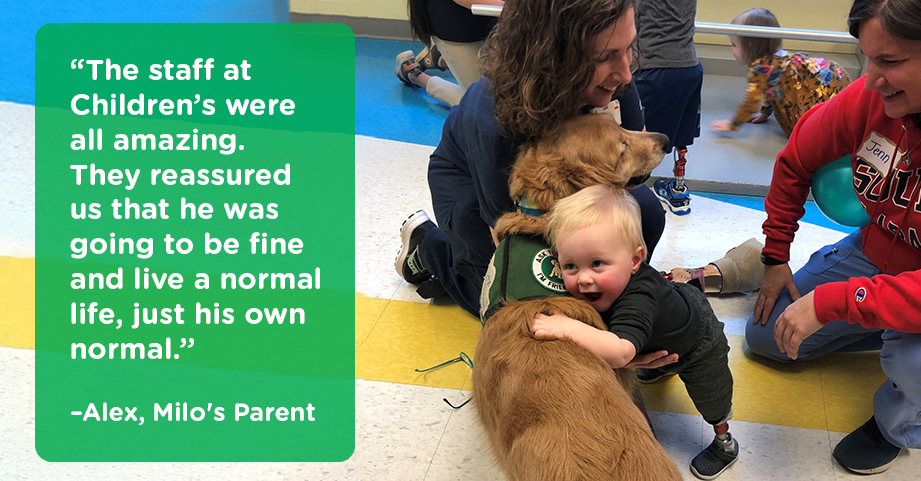
Canines For Kids
All dogs are special, but at Children’s Healthcare of Atlanta, we have a furry fleet of 11 specially trained pups that truly go above and beyond to be a friend—and more—to those in need. They inspire confidence and instill strength. They provide comfort and companionship, and they bring out joy even in challenging situations. Children’s welcomed Casper, our first facility dog, to our staff in 2009. The first program of its kind in the country, Canines For Kids has since grown into a thriving program.
Canines For Kids is a goal-directed program that helps patients cope, heal and achieve treatment goals while at the hospital. Each hospital-based facility dog has a Children’s employee handler who is responsible for caring and managing the dog. Our dogs and trained handlers work as a team to provide comfort, support and distraction for our young patients during procedures and hospitalization.
Each facility dog works with our healthcare providers to:
- Decrease anxiety and stress associated with the hospital environment and to increase normalization of the surroundings.
- Support the overall social, physical, and emotional development and treatment of the patient.
- Provide distraction and support during procedures, tests and the general experience of hospitalization.
- Motivate and encourage patients to reach treatment goals, such as learning to walk or taking medication.
- Reduce feelings of loss and loneliness associated with being separated from home, family and pets.
- Offer the patient unconditional love and acceptance through physical contact and soft touch.
- Provide comfort following traumatic events.
If your family is interested in a visit from one of our facility dogs during your hospital stay, ask your nurse or child life specialist.
Support Canines For Kids
As a 100% donor-funded program, we rely on generous donors to help keep our dogs in tip-top shape. Your support of Canines For Kids helps our program be able to serve patients for generations to come.
Give TodayAt Children’s, our dogs not only give love and comfort, they also aid clinical teams in their goals of providing treatment to kids.
Alex Robinson did not know parts of her son’s legs had not developed until he was born with a bilateral lower limb deficiency. Before Milo was even 2 weeks old, his parents, Alex and Jennifer Robinson, brought Milo to the Comprehensive Limb Difference Program at Children’s searching for answers.
“The staff at Children’s were all amazing,” Alex said. “They reassured us that he was going to be fine and live a normal life, just his own normal.”
Just shy of 11 months old, Milo underwent surgery with Michael Schmitz, MD, Chief of the Orthopedics and Sports Medicine Center at Children’s. A month later, Milo got his first pair of prosthetics. When Milo was learning to get comfortable using his new legs, he often has one destination in mind: the family dogs.
After meeting Allis, a facility dog at Children's serving our orthotics and prosthetic patients, during one of his therapy appointments, the pair built an unbreakable bond. In an effort to encourage mobility, Allis and her handler worked alongside Milo’s therapists to serve as a source of motivation. Allis was more than up for the challenge—excited by the prospect of petting his furry friend, Milo practiced walk using his prosthetic legs.“Milo is amazing,” said Alex. “He never missed a milestone. He was early on crawling, sitting, rolling, all that. He was pretty on time with everything. He loves anytime we get to see Allis during our visits to Children’s.”
Alex describes her little one as very determined, strong-willed and independent. His parents think these qualities enabled the now 2-year-old Milo to figure out how to do things in his own way, both before surgery and today, with his second pair of legs. And it’s safe to say that Milo and Allis will never be too far apart during future therapies, as this persistent toddler takes the next step in his journey.

Contact Us Email Canines For Kids





